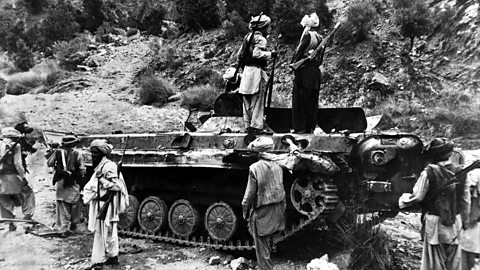The 'Prague Spring'
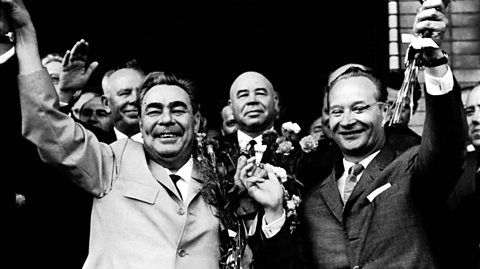
Czechoslovakia had been a communismA system of running a country in which all means of production such as tools, factories and raw materials, are owned by the community as a whole. Private property does not exist and each individual contributes according to their ability and receives according to their needs. This means there is no hierarchy of social class. country, controlled by Moscow, since the end of the World War Two.
Twelve years after the brutal suppression of the Hungarians, Czechoslovakia posed a similar challenge to the Soviet Union.
In 1964, Khrushchev had been ousted from power, and was replaced by Leonid Brezhnev.
In 1968, the Czech people attempted to exert some control over their own lives and reform the communist system to create 'socialism with a human face'.
This attempt, known as the Prague Spring, lasted for four months until it was crushed by the Soviet Red Army
Question
What does 'socialism with a human face' mean?
This meant keeping the socialismA political system in which all property and wealth is owned by the whole community and not by individuals. model of government in Czechoslovakia but guaranteeing a better delivery of goods, services and freedoms to the Czech people.
Causes of the Prague Spring
Economy
- The Czech economy was in recessionA time of temporary economic decline when trade and industrial activity are reduced..
- Workers remained in poor housing and had the most basic of lifestyles.
- Farmers also had to follow communistSomeone who believes in the political ideology of communism, a system of running a country in which all means of production such as tools, factories and raw materials, are owned by the community as a whole. Private property does not exist and each individual contributes according to their ability and receives according to their needs. This means there is no hierarchy of social class. Party rules with regards to agriculture.
- Industrial products were being exported to the USSR.
Political discontent
- Students were resentful of the restrictions on their freedom.
Living standards
- By the 1960s there was poverty, mainly due to inflation, food shortages and falling living standards.
Events of the Prague Spring
In January 1968, Alexander DubÄek became the new communistSomeone who believes in the political ideology of communism, a system of running a country in which all means of production such as tools, factories and raw materials, are owned by the community as a whole. Private property does not exist and each individual contributes according to their ability and receives according to their needs. This means there is no hierarchy of social class. leader of Czechoslovakia.
Although DubÄek was a committed communist, he believed that communism did not have to be as restrictive as it had been.
He agreed to introduce reforms in April 1968 which would provide āsocialism with a human faceā.
These included:
- less censorshipThe examining of different forms of media and removing or suppressing parts considered to be unacceptable..
- more freedom of speech
- legalisation of political opposition groups
- reduction in the activities of the secret police
- a reintroduction of capitalistThe economic idea that countries should be run based on private business, trade, stocks and shares, and profit.elements into the Czech economy
The reforms, when they were introduced in April 1968, led to a greater feeling of hope among the population.
This became known as the 'Prague Spring'.
However, DubÄek stressed that they would remain in the Warsaw PactA collection of 12 communist countries that agreed to defend each other if one of them was attacked. and ComeconThe Council for Mutual Economic Assistance was an organisation set up by the Soviet Union to provide financial aid to communist countries in Eastern Europe and elsewhere., but these reassurances were not enough to prevent a Soviet invasion.
The Soviet response
DubÄekās reforms began to worry the Soviets because although he claimed to be a committed communistSomeone who believes in the political ideology of communism, a system of running a country in which all means of production such as tools, factories and raw materials, are owned by the community as a whole. Private property does not exist and each individual contributes according to their ability and receives according to their needs. This means there is no hierarchy of social class., his proposals went against their control.
The Soviets also feared that the liberalPolicies that offer freedom or greater independence to people. ideas from these reforms would spread across Europe and cause instability on Russiaās side of the Iron CurtainA phrase used by Winston Churchill to describe the division in Europe between the communist east and capitalist west.
- April 1968: DubÄek introduced reforms.
- July 1968: 4 countries within the Iron Curtain, alongside the USSR, wrote to DubÄek to express their concern. He sent them back assurances.
- 20 August 1968: 500,000 troops entered Czechoslovakia after Brezhnev received a letter from four Czech communists requesting help.
- The Czech government called upon their people to enact passive resistanceTo peacefully oppose something. with peaceful protest tactics such as standing in front of tanks and offering flowers to soldiers.
- DubÄek was arrested and taken to Moscow. When he returned he declared the Prague Spring was over.The pro-Soviet, GustĆ”v HusĆ”k, was installed as the new Czech leader. He quickly reversed DubÄekās reforms.
The Brezhnev Doctrine
Brezhnev declared that the USSR would not allow the countries of Eastern Europe to reject communismA system of running a country in which all means of production such as tools, factories and raw materials, are owned by the community as a whole. Private property does not exist and each individual contributes according to their ability and receives according to their needs. This means there is no hierarchy of social class., "even if it meant a third World War."
This became known as the Brezhnev Doctrine.
The USSR feared liberalPolicies that offer freedom or greater independence to people.ideas would spread to other Eastern European states causing instability and threatening the security of the Soviet Union.
They feared growing trade links between Czechoslovakia and West Germany would lead to an increase in Western influence in Eastern Europe.
To the USSR, it was important to hold onto Czechoslovakia which had the strongest industry in the Eastern blocCountries in Eastern Europe that were controlled by the Soviet Union, for example Poland, Hungary and Czechoslovakia..
The response of the West
The Western powers did nothing to actively support the Czechs in their āPrague Springā, although there was widespread international criticism of Moscowās actions in Czechoslovakia.
- The USA accepted that the Soviets were taking this action in their own sphere of influenceIn international politics, an area in which one nation holds, or claims to hold, dominant power over a country or several countries..
- The USA was not going to consider any intervention that would constitute rollbackAn American policy to not just contain communism, but turn communist countries back to capitalism.of communismA system of running a country in which all means of production such as tools, factories and raw materials, are owned by the community as a whole. Private property does not exist and each individual contributes according to their ability and receives according to their needs. This means there is no hierarchy of social class. in Eastern Europe, or an 'act of war.'
- The USA was more focused on the Vietnam WarA war between communist North Vietnam and non-communist South Vietnam for control of the whole of Vietnam; the USA sent American troops to protect South Vietnam..
- The USA would have been surrounded in Czechoslovakia had they sent support.
- President Lyndon B Johnson did not want to provoke Moscow.
The consequences and impact on international relations
- The Brezhnev DoctrineThe Soviet Unionās policy of sending troops into communist countries against people who opposed those governments. seemed to bring an end to peaceful co-existence.
- The revival of traditional Cold WarThe political tension and competition for power that existed between the communist East and the democratic West after World War Two. The two sides did not ever go to war. tactics was a setback for improving international relations.
- Relations deteriorated further as both the USA and the USSR continued to stockpile their weapons.
- Some progress was made and agreements were signed including the Helsinki AccordsAn act signed in 1975 by the US, the Soviet Union and most European countries that aimed to bring the West and Eastern bloc countries closer together. However, it was a non-binding agreement. and SALT IThe first of the Strategic Arms Limitation Talks, an agreement signed in 1972 by US President Richard Nixon and Soviet Union leader Leonid Brezhnev to begin to reduce the number of nuclear weapons owned by America and the Soviet Union..
- The USSRās action in Czechoslovakia suggested that their grip on their satellite stateAn officially independent country that is strongly influenced or controlled by another country. was weakening. Romania moved towards a more independent foreign policy and strikes followed in Poland in 1970.
Test your knowledge
More on International relations, 1945-2003
Find out more by working through a topic
- count7 of 13
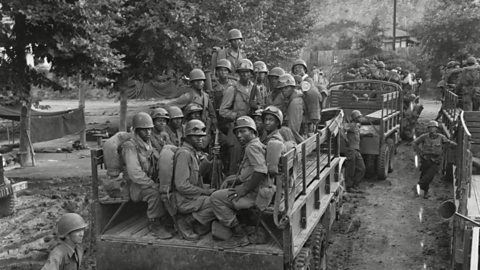
- count8 of 13
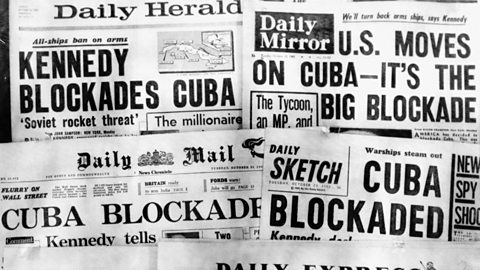
- count9 of 13
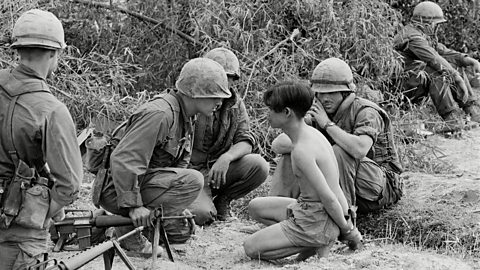
- count10 of 13
